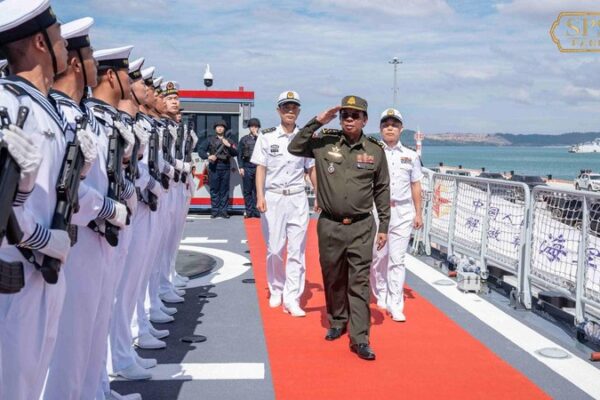INTERVIEW: Former North Korean diplomat on the drawbacks of being elite
Ryu Hyun-woo was North Korea’s acting ambassador to Kuwait when he defected to South Korea in 2019. As one of the elites in North Korea, he had rights and privileges that ordinary citizens do not. But at the same time, he and others like him were under even more scrutiny than the average citizen, he says. Ryu lived in an apartment complex in Pyongyang where all of his neighbors were high-ranking North Korean officials. In an interview with RFA Korean, Ryu explained that life as an elite is like already having “one foot in hell” because of the constant surveillance their lives are under, and how easily they are discarded if the leader needs someone to take the blame. The interview has been edited for length and clarity. RFA: Can you tell us a little bit about your background? Ryu: I was born in Pyongyang. I graduated from the Pyongyang Foreign Language Institute and Pyongyang University of Foreign Studies, majoring in Arabic. I then joined the Ministry of Foreign Affairs and worked there for over 20 years. After working as a diplomat in Syria and Kuwait, I came to South Korea in September 2019. I have settled in and I am living well in South Korea. RFA: When you were in North Korea, you lived in and exclusive area of Pyongyang, correct? Do all the elites live in the same area? Ryu: The administrative district name is Uiam-dong, Taedonggang district, Pyongyang. This place is also called Eundok village, and it is the residence of many officials. There are six major buildings in the residence. The generals of the North Korean People’s Army live in four of the buildings. One building is for high-ranking officials in the Central Committee. The remaining one is where high-ranking officials of the administrative department live. RFA: We often hear about North Korea’s chronic shortages of electricity. Did the elevators on these buildings cut out from time to time like they do for everyone else living in apartments? Ryu: You’re right. North Korea has a poor power supply system. Because of it, the elevator sometimes stops working. However, there are times when it operates normally. For example, during commuting hours, it is guaranteed. Nevertheless, the electricity often drops even during commuting hours. My house was on the 4th floor. Oh Guk Ryol, the head of the operations department, lived on the 5th floor, and Director Kim Yang Gon lived on the 3rd floor. The former head of the United Front Work Department and Oh Guk Ryol came down from the floors above, and my father-in-law (Jon Il Chun, the former head Office 39, the secretive organization that manages the slush funds of the Kim family) and I would get on to the elevator. As we were going down, Kim Yang Gon got on. Then just as the elevator was going down to the second floor, it suddenly stopped. I was the youngest of everyone there, so I had no choice but to open the escape hatch on the ceiling of the elevator. It’s like a vent. I climbed up to the third floor and I saw something that looked like a latch that opens the elevator door. I opened the door with it, contacted the management, and rescued the other officials in the elevator. The electricity situation was so bad. RFA: Can living in that area of Pyongyang be seen as a matter of pride for its residents? Ryu: It can be interpreted as having a lot of trust and high loyalty. However, there are pros and cons. Once you enter this place, you are subject to wiretapping, stalking and strong surveillance. You can’t say anything inside your house. For example, wasn’t Chief of Staff Ri Yong Ho shot to death? It was because he was at home making slanderous remarks about Kim Jong Un with his wife. He was purged and disappeared. My mother-in-law kept pointing to her mouth whenever I tried to complain about something. She told me to be quiet and not to say anything because they listen to everything. To that extent, they wiretap 24 hours a day. That’s why there is a different way to share thoughts. My in-laws would wake up around 5:30 in the morning. I would wake up around 6 o’clock. Then we go for a jog or walk together. That’s the time my father-in-law would ask me questions and I would also talk to him. For example, while I was in Syria, I heard a South Korean refer to my father-in-law as ‘Kim Jong Il’s safekeeper,’ so I passed that on to my father-in-law. RFA: You told your father-in-law about something that came out in the South Korean media? Ryu: I told my father-in-law that in South Korea, he is referred to as ‘Kim Jong Il’s safekeeper.’ My father-in-law laughed. I told him those things, secret things that should not be caught by wiretapping. We exchanged stories like that while taking a walk or in a place where wiretapping does not work. Ryu Hyun-woo (right), who served as North Korea’s acting ambassador to Kuwait in 2019, escaped from North Korea and has now settled in South Korea, in a frame grab from an interview with RFA Korea. (RFA) RFA: Was there ever any frightful incident you witnessed while living there? Ryu: The household we were closest to was Park Nam Ki, director of the Planning and Finance Department of the ruling party of North Korea. Do you remember the currency reform in 2009? (That was when North Korea introduced new versions of its paper currency, but allowed the people to exchange only a certain amount of their old currency, thereby wiping out most people’s savings.) As a result of that incident, Park Nam Ki was shot to death in January 2010. In February of the same year, Park Nam Ki’s entire family members went to a political prison camp. I remembered it was around 1 or 2 o’clock in the morning. There was a truck from…



